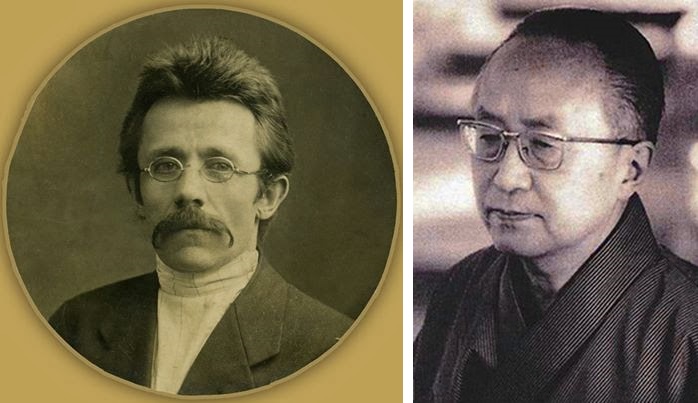He made the first translation of the Quran from Arabic to Japanese: Who is Toshihiko Izutsu?
Toshihiko Izutsu is a Japanese researcher and writer who has gained worldwide fame with his works in various fields, including Eastern thought, especially Buddhism and Islamic thought. Throughout his life, he examined different religions, cultures, and philosophies and produced many works that would bridge the gap between East and West.

On the left in the photo is Musa Carullah, a religious scholar and intellectual from Kazan.
Toshihiko Izutsu was born on May 4, 1914, in Tokyo, the capital of Japan. In his childhood, under the influence of his father, a Zen Buddhist master, he was closely interested in the basic principles and discipline of religion. From his early youth, he began to spend time at the Islamic Center, which was founded by Muslims who fled Russia and came to Tokyo due to the Bolshevik Revolution that abolished the Romanov Dynasty.
He completed his undergraduate and graduate studies in English Language and Literature at Keio University in Tokyo and later taught linguistics courses with Greek and Latin philosophy texts at the same university. Around this time, he decided to learn Arabic under the guidance of Okawa Shumei, who would write the first Japanese translation of the Quran in 1945. After a long search for an "Arabic teacher", he crossed paths with Abdürreşid İbrahim Efendi. Abdürreşid İbrahim Efendi, who came to Japan for a long visit, which he had visited several times before, was struggling to build a mosque in Tokyo at that time. Izutsu heard Arabic sounds and the Arabic recitation of the Quran from him for the first time and continued the lessons for long periods of time.
Toshihiko Izutsu (4 May 1914 – 7 January 1993) was a Japanese scholar who specialized in Islamic studies and comparative religion. He took an interest in linguistics at a young age, and came to know more than thirty languages, including Arabic, Hebrew, Turkish, Persian, Sanskrit, Pali, Hindustani, Russian, Greek, and Chinese. He is widely known for his translation of the Qurʾān into Japanese.
As a result of the lessons that continued for a while, Abdürreşid İbrahim Efendi told Izutsu that he was not a very good Arabic teacher and that the real master of the language would come to Tokyo soon and directed his student to Musa Carullah. Izutsu soon started taking lessons with Musa Carullah, who came to the city upon the invitation of Abdülhay Kurban Ali and Abdürreşid İbrahim Efendi, two of the leaders of the Tatar community in Tokyo.
He worked as an Eastern languages expert at the Institute of Language and Culture Research, which was established in 1942, and learned Hebrew and Persian during his time there. He completed the Japanese translation of the Quran, which he started in 1951, after 7 years of work, thus making the first translation of the Quran from Arabic into Japanese.
After completing his translation of the Quran, Izutsu went to the Middle East, lived in Lebanon and Egypt for a while, and learned Western languages such as Italian, French, and Spanish. He went to Canada in 1961 and taught courses on Abu'l-Hasan al-Ashārī, Ibn Sina, Imam Ghazali, Shehabeddin al-Suhrawardī al-Maktul, and Muhyiddin Ibn al-Arabi at the Institute of Islamic Studies at McGill University. He was among the founders of the Tehran branch of the institute and went to Iran periodically and gave lectures at Tehran University.
Izutsu, who retreated for a long time after returning to Tokyo in 1979, became an ordinary professor in 1982 and started teaching at Keio University again. Toshihiko Izutsu, who examined different religions, cultures, and philosophies throughout his 79-year life and produced many works that would bridge the gap between East and West, died on January 7, 1993.
